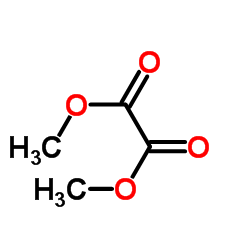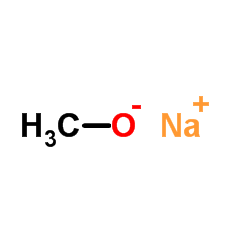20577-61-1
| 中文名 | 乙酰丙酮酸甲酯 |
|---|---|
| 英文名 | methyl 2,4-dioxopentanoate |
| 中文别名 |
乙酰丙酮甲酯
甲基 2,4-二氧代戊酸酯 |
| 英文别名 |
acetylpyruvic acid methyl ester
methyl ester of acetylpyruvic acid methyl 2,4-dioxo-pentanoate BB_SC-1708 2,4-dioxopentanoic acid methyl ester methyl 2,2-dioxopentanoate Pentanoic acid,2,4-dioxo-,methyl ester EINECS 243-891-3 Methyl acetopyruvate MFCD00043638 1-Methoxy-1,2,4-pentanetrione Acetylbrenztraubensaeuremethylester RD-04 Methyl 2,4-dioxopentanoate Methyl acetylpyruvate |
| 密度 | 1.15g/cm3 |
|---|---|
| 沸点 | 195.1ºC at 760mmHg |
| 熔点 | 63-64 °C |
| 分子式 | C6H8O4 |
| 分子量 | 144.12500 |
| 闪点 | 75.5ºC |
| 精确质量 | 144.04200 |
| PSA | 60.44000 |
| 外观性状 | 白色或淡黄色针状 |
| 蒸汽压 | 0.00067mmHg at 25°C |
| 折射率 | 1.467 |
| 储存条件 | 保持贮藏器密封 放入紧密的贮藏器内,储存在阴凉,干燥的地方 |
| 稳定性 | 如果遵照规格使用和储存则不会分解 避免接触氧化物,还原剂,酸,碱 |
| 分子结构 | 1、 摩尔折射率:31.68 2、 摩尔体积(m3/mol):125.2 3、 等张比容(90.2K):305.7 4、 表面张力(dyne/cm):35.4 5、 极化率(10-24cm3):12.55 |
| 计算化学 | 1.疏水参数计算参考值(XlogP):-0.1 2.氢键供体数量:0 3.氢键受体数量:4 4.可旋转化学键数量:4 5.互变异构体数量:5 6.拓扑分子极性表面积60.4 7.重原子数量:10 8.表面电荷:0 9.复杂度:171 10.同位素原子数量:0 11.确定原子立构中心数量:0 12.不确定原子立构中心数量:0 13.确定化学键立构中心数量:0 14.不确定化学键立构中心数量:0 15.共价键单元数量:1 |
| 更多 | 1.性状:固体 2.密度(g/mL,25/4℃):未确定 3.相对蒸汽密度(g/mL,空气=1):未确定 4.熔点(ºC):62-63 5.沸点(ºC,常压):未确定 6.沸点(ºC,5.2kPa):未确定 7.折射率:未确定 8.闪点(ºC):未确定 9.比旋光度(º):未确定 10.自燃点或引燃温度(ºC):未确定 11.蒸气压(kPa,25ºC):未确定 12.饱和蒸气压(kPa,60ºC):未确定 13.燃烧热(KJ/mol):未确定 14.临界温度(ºC):未确定 15.临界压力(KPa):未确定 16.油水(辛醇/水)分配系数的对数值:未确定 17.爆炸上限(%,V/V):未确定 18.爆炸下限(%,V/V):未确定 19.溶解性:未确定 |
Synonym:None Known Section 2 - COMPOSITION, INFORMATION ON INGREDIENTS
Risk Phrases: None Listed. Section 3 - HAZARDS IDENTIFICATION EMERGENCY OVERVIEW
The toxicological properties of this material have not been fully investigated. Potential Health Effects Eye: May cause eye irritation. Skin: May cause skin irritation. May be harmful if absorbed through the skin. Ingestion: May cause irritation of the digestive tract. The toxicological properties of this substance have not been fully investigated. May be harmful if swallowed. Inhalation: May cause respiratory tract irritation. The toxicological properties of this substance have not been fully investigated. May be harmful if inhaled. Chronic: No information found. Section 4 - FIRST AID MEASURES Eyes: In case of contact, immediately flush eyes with plenty of water for at least 15 minutes. Get medical aid. Skin: In case of contact, flush skin with plenty of water. Remove contaminated clothing and shoes. Get medical aid if irritation develops and persists. Wash clothing before reuse. Ingestion: If swallowed, do not induce vomiting unless directed to do so by medical personnel. Never give anything by mouth to an unconscious person. Get medical aid. Inhalation: If inhaled, remove to fresh air. If not breathing, give artificial respiration. If breathing is difficult, give oxygen. Get medical aid. Notes to Physician: Treat symptomatically and supportively. Section 5 - FIRE FIGHTING MEASURES General Information: As in any fire, wear a self-contained breathing apparatus in pressure-demand, MSHA/NIOSH (approved or equivalent), and full protective gear. During a fire, irritating and highly toxic gases may be generated by thermal decomposition or combustion. Extinguishing Media: Use water spray, dry chemical, carbon dioxide, or chemical foam. Section 6 - ACCIDENTAL RELEASE MEASURES General Information: Use proper personal protective equipment as indicated in Section 8. Spills/Leaks: Vacuum or sweep up material and place into a suitable disposal container. Clean up spills immediately, observing precautions in the Protective Equipment section. Avoid generating dusty conditions. Provide ventilation. Section 7 - HANDLING and STORAGE Handling: Wash thoroughly after handling. Use with adequate ventilation. Minimize dust generation and accumulation. Avoid breathing dust, vapor, mist, or gas. Avoid contact with eyes, skin, and clothing. Keep container tightly closed. Avoid ingestion and inhalation. Storage: Store in a cool, dry place. Store in a tightly closed container. Section 8 - EXPOSURE CONTROLS, PERSONAL PROTECTION Engineering Controls: Facilities storing or utilizing this material should be equipped with an eyewash facility and a safety shower. Use adequate ventilation to keep airborne concentrations low. Exposure Limits CAS# 20577-61-1: Personal Protective Equipment Eyes: Wear appropriate protective eyeglasses or chemical safety goggles as described by OSHA's eye and face protection regulations in 29 CFR 1910.133 or European Standard EN166. Skin: Wear appropriate protective gloves to prevent skin exposure. Clothing: Wear appropriate protective clothing to prevent skin exposure. Respirators: Follow the OSHA respirator regulations found in 29 CFR 1910.134 or European Standard EN 149. Use a NIOSH/MSHA or European Standard EN 149 approved respirator if exposure limits are exceeded or if irritation or other symptoms are experienced. Section 9 - PHYSICAL AND CHEMICAL PROPERTIES Physical State: Needles Color: white - faint yellow Odor: Not available. pH: Not available. Vapor Pressure: Not available. Viscosity: Not available. Boiling Point: Not available. Freezing/Melting Point: 62-63 deg C Autoignition Temperature: Not available. Flash Point: Not available. Explosion Limits, lower: Not available. Explosion Limits, upper: Not available. Decomposition Temperature: Solubility in water: Specific Gravity/Density: Molecular Formula: C6H8O4 Molecular Weight: 144.13 Section 10 - STABILITY AND REACTIVITY Chemical Stability: Stable under normal temperatures and pressures. Conditions to Avoid: Dust generation. Incompatibilities with Other Materials: Acids, bases, oxidizing agents, reducing agents. Hazardous Decomposition Products: Carbon monoxide, carbon dioxide. Hazardous Polymerization: Has not been reported Section 11 - TOXICOLOGICAL INFORMATION RTECS#: CAS# 20577-61-1 unlisted. LD50/LC50: Not available. Carcinogenicity: Methyl acetopyruvate - Not listed by ACGIH, IARC, or NTP. Section 12 - ECOLOGICAL INFORMATION Section 13 - DISPOSAL CONSIDERATIONS Dispose of in a manner consistent with federal, state, and local regulations. Section 14 - TRANSPORT INFORMATION IATA Not regulated as a hazardous material. IMO Not regulated as a hazardous material. RID/ADR Not regulated as a hazardous material. Section 15 - REGULATORY INFORMATION European/International Regulations European Labeling in Accordance with EC Directives Hazard Symbols: Not available. Risk Phrases: Safety Phrases: S 24/25 Avoid contact with skin and eyes. WGK (Water Danger/Protection) CAS# 20577-61-1: No information available. Canada None of the chemicals in this product are listed on the DSL/NDSL list. CAS# 20577-61-1 is not listed on Canada's Ingredient Disclosure List. US FEDERAL TSCA CAS# 20577-61-1 is not listed on the TSCA inventory. It is for research and development use only. SECTION 16 - ADDITIONAL INFORMATION N/A |
|
生态学数据: 对水是稍微危害的,若无政府许可,勿将材料排入周围环境。
|
| 符号 |

GHS07 |
|---|---|
| 信号词 | Warning |
| 危害声明 | H319 |
| 警示性声明 | P305 + P351 + P338 |
| 个人防护装备 | dust mask type N95 (US);Eyeshields;Gloves |
| 危害码 (欧洲) | F,Xi |
| 风险声明 (欧洲) | R36 |
| 安全声明 (欧洲) | S24/25-S26 |
| 危险品运输编码 | NONH for all modes of transport |
| 海关编码 | 2918300090 |
|
~92% 
20577-61-1 |
| 文献:Li, Bin; Yang, Huibin; Wang, Junfeng; Yu, Haibo; Zhang, Hong; Li, Zhinian; Song, Yuquan Patent: US2011/46186 A1, 2011 ; Location in patent: Page/Page column 7 ; |
|
~% 
20577-61-1 |
| 文献:Acta Chemica Scandinavica (1947-1973), , vol. 3, p. 335,347 Gazzetta Chimica Italiana, , vol. 68, p. 616 Journal of the American Chemical Society, , vol. 67, p. 1508 |
| 海关编码 | 2918300090 |
|---|---|
| 中文概述 | 2918300090 其他含醛基或酮基不含其他含氧基羧酸(包括酸酐、酰卤化物、过氧化物和过氧酸及该税号的衍生物). 增值税率:17.0% 退税率:9.0% 监管条件:无 最惠国关税:6.5% 普通关税:30.0% |
| 申报要素 | 品名, 成分含量, 用途 |
| Summary | 2918300090 other carboxylic acids with aldehyde or ketone function but without other oxygen function, their anhydrides, halides, peroxides, peroxyacids and their derivatives。Supervision conditions:None。VAT:17.0%。Tax rebate rate:9.0%。MFN tariff:6.5%。General tariff:30.0% |





